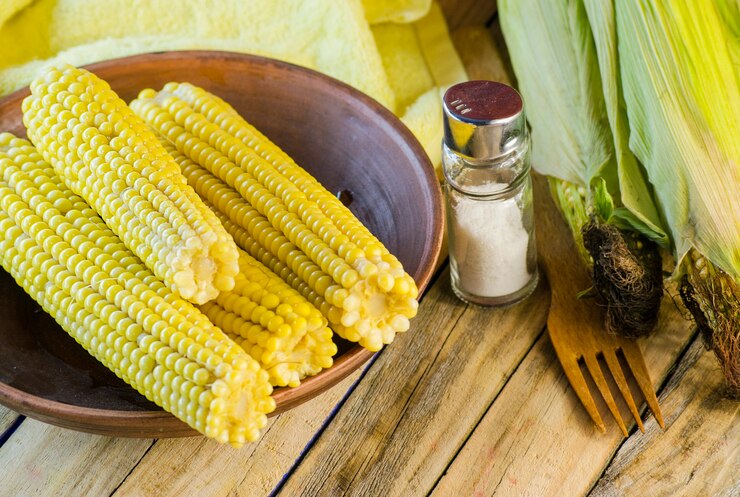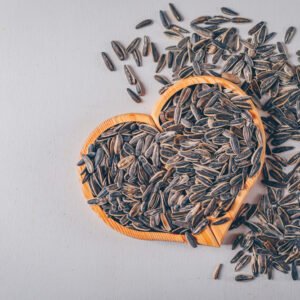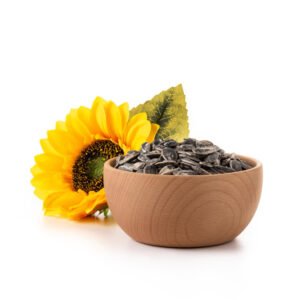In the vast landscape of agricultural commodities, few crops have captured the world’s attention quite like maize. This golden grain, also known as corn, stands as one of humanity’s most valuable agricultural treasures. At CMS Industries, we recognize maize as more than just a staple crop – it’s a powerhouse of nutrition that has sustained civilizations for thousands of years while continuing to offer remarkable health benefits in our modern world.
As leading agricultural products manufacturers and suppliers in India, we understand the critical importance of crops that not only feed the world but also nourish it comprehensively. Maize exemplifies this perfect balance, serving as both a fundamental food source and a remarkable contributor to human health and wellness. Through our commitment to quality agricultural products and sustainable farming practices, we’ve witnessed firsthand how premium maize varieties can transform both agricultural productivity and nutritional outcomes. As a trusted Maize Corn Starch Manufacturer, Supplier & Exporter in India, we ensure our maize-based solutions meet the highest standards to support diverse industries and promote better health worldwide.
The significance of maize extends far beyond its role as animal feed or industrial raw material. This versatile grain addresses one of the most pressing challenges of our time: providing accessible, nutritious food that supports optimal health while remaining economically viable for farmers and consumers alike. With global populations continuing to grow and nutritional awareness reaching new heights, understanding the comprehensive health benefits of maize becomes increasingly crucial for farmers, distributors, and health-conscious consumers worldwide.
Understanding Maize: The Foundation of Global Nutrition
Maize represents one of the world’s three most important cereal grains, alongside wheat and rice. This remarkable crop originates from Central America but has adapted to virtually every climate and agricultural system across the globe. At CMS Industries, our expertise in agricultural products manufacturing has allowed us to observe how different maize varieties offer varying nutritional profiles, each contributing unique health benefits to human nutrition.
The nutritional composition of maize makes it an exceptional choice for health-conscious consumers and agricultural businesses seeking to provide superior food products. Rich in essential carbohydrates, dietary fiber, vitamins, minerals, and antioxidants, maize delivers comprehensive nutrition in an easily accessible and versatile form. Our commitment to quality agricultural products ensures that the maize varieties we supply maintain optimal nutritional density while meeting the highest standards of purity and safety.
Modern agricultural research continues to reveal new aspects of maize’s nutritional complexity. Beyond its primary macronutrients, maize contains numerous bioactive compounds that contribute to its health-promoting properties. These discoveries reinforce our mission at CMS Industries to provide premium agricultural commodities that support both agricultural success and human wellness through scientifically-backed, nutrient-dense products.
The Top 15 Health Benefits of Maize
1. Exceptional Source of Energy and Carbohydrates
Maize serves as an outstanding source of complex carbohydrates, providing sustained energy release that supports active lifestyles and optimal metabolic function. The carbohydrate profile in maize includes both simple and complex forms, ensuring immediate energy availability while promoting long-term satiety. This makes maize an ideal food choice for athletes, laborers, and anyone requiring consistent energy throughout the day.
The energy-providing capabilities of maize stem from its balanced composition of starch, sugars, and dietary fiber. Unlike simple carbohydrate sources that cause rapid blood sugar spikes, maize provides steady glucose release, supporting stable energy levels and reducing the risk of energy crashes. This characteristic makes maize particularly valuable for managing energy requirements in both athletic performance and daily activities.
For agricultural communities and developing regions where consistent energy sources remain crucial for productivity and well-being, maize represents an accessible and reliable solution. Our agricultural products at CMS Industries focus on varieties that maximize these energy-providing benefits while maintaining superior taste and nutritional value.
2. Rich in Essential Dietary Fiber
The fiber content in maize contributes significantly to digestive health and overall wellness. Dietary fiber supports healthy digestion by promoting regular bowel movements, preventing constipation, and maintaining optimal gut bacteria balance. The insoluble fiber in maize adds bulk to stool while soluble fiber helps regulate blood sugar and cholesterol levels.
Research demonstrates that adequate fiber intake from sources like maize can reduce the risk of colorectal cancer, improve cardiovascular health, and support weight management. The fiber in maize also promotes satiety, helping individuals maintain healthy eating patterns and prevent overeating. This makes maize an excellent choice for those seeking to improve their overall dietary quality.
The prebiotic properties of maize fiber support beneficial gut bacteria growth, contributing to improved immune function and overall health. As agricultural product suppliers committed to nutrition and wellness, we recognize the importance of providing maize varieties that maximize these fiber-related health benefits while maintaining excellent palatability and cooking characteristics.
3. Powerful Antioxidant Properties
Maize contains numerous antioxidant compounds that protect cells from oxidative stress and reduce inflammation throughout the body. These antioxidants include carotenoids, phenolic compounds, and vitamin E, all of which contribute to cellular protection and long-term health maintenance. The antioxidant activity in maize helps combat free radicals that can contribute to chronic diseases and aging processes.
The carotenoid content in maize, particularly lutein and zeaxanthin, provides specific benefits for eye health and vision protection. These compounds accumulate in the retina, where they help filter harmful blue light and protect against age-related macular degeneration. The antioxidant properties of maize extend beyond eye health to support cardiovascular function and immune system strength.
Yellow maize varieties typically contain higher concentrations of these beneficial antioxidants, making variety selection important for maximizing health benefits. Our commitment to providing premium agricultural products ensures that farmers and consumers have access to maize varieties optimized for both nutritional content and antioxidant activity.
4. Supports Cardiovascular Health
The cardiovascular benefits of maize stem from its combination of fiber, antioxidants, and beneficial plant compounds. Regular maize consumption has been associated with improved cholesterol profiles, reduced blood pressure, and decreased risk of heart disease. The soluble fiber in maize helps bind cholesterol in the digestive system, preventing its absorption and supporting healthy cholesterol levels.
The potassium content in maize contributes to blood pressure regulation by supporting proper fluid balance and vascular function. Additionally, the antioxidants in maize help protect blood vessels from oxidative damage, maintaining cardiovascular health over time. These combined effects make maize a valuable component of heart-healthy dietary patterns.
Magnesium present in maize supports normal heart rhythm and muscle function, while the B-vitamins contribute to homocysteine metabolism, reducing cardiovascular risk factors. For populations at risk of cardiovascular disease, incorporating high-quality maize into the diet represents a practical and effective nutritional strategy.
5. Excellent Source of B-Vitamins
Maize provides substantial amounts of several B-vitamins essential for energy metabolism, nervous system function, and cellular health. Thiamine (B1) supports energy production and nervous system function, while niacin (B3) contributes to DNA repair and cellular energy production. These vitamins play crucial roles in maintaining optimal health and preventing deficiency-related conditions.
The folate content in maize makes it particularly valuable for pregnant women and those planning pregnancy, as adequate folate intake prevents neural tube defects and supports proper fetal development. Folate also contributes to red blood cell formation and DNA synthesis, making it essential for all age groups.
Pyridoxine (B6) in maize supports protein metabolism, immune function, and neurotransmitter synthesis. These B-vitamins work synergistically to support energy production, brain function, and overall metabolic health, making maize an excellent choice for supporting optimal nutrition across diverse populations.
6. Promotes Digestive Health
Beyond its fiber content, maize supports digestive health through multiple mechanisms. The combination of soluble and insoluble fiber promotes healthy gut bacteria growth while supporting regular bowel movements and optimal digestive function. The prebiotic properties of maize fiber feed beneficial bacteria, contributing to a healthy gut microbiome.
The starch in maize includes resistant starch components that act as prebiotics, reaching the colon intact and supporting beneficial bacteria growth. This contributes to improved gut health, enhanced immune function, and better overall digestive wellness. The gentle nature of maize makes it well-tolerated by most individuals, including those with sensitive digestive systems.
The traditional preparation methods for maize, such as nixtamalization, can enhance its digestive benefits by improving nutrient availability and reducing antinutrient content. Our agricultural products focus on varieties and processing methods that maximize these digestive health benefits while maintaining excellent taste and nutritional value.
7. Supports Eye Health and Vision
The carotenoid content in maize, particularly lutein and zeaxanthin, provides exceptional benefits for eye health and vision protection. These compounds accumulate in the macula of the eye, where they help filter harmful blue light and protect against oxidative damage. Regular consumption of carotenoid-rich maize can help prevent age-related macular degeneration and support long-term vision health.
The vitamin A precursors in maize contribute to night vision and overall eye function. Beta-carotene and other carotenoids convert to vitamin A as needed, supporting retinal function and preventing night blindness. These benefits make maize particularly valuable for populations at risk of vitamin A deficiency.
Research demonstrates that individuals with higher dietary intake of lutein and zeaxanthin from sources like maize have significantly lower rates of age-related eye diseases. The bioavailability of these compounds from maize is enhanced when consumed with healthy fats, making maize an excellent component of balanced, nutrient-dense meals.
8. Provides Essential Minerals
Maize contains numerous essential minerals that contribute to optimal health and physiological function. Magnesium in maize supports bone health, muscle function, and energy metabolism, while phosphorus contributes to bone and teeth formation and cellular energy production. These minerals work together to support overall health and wellness.
The iron content in maize, while not as high as in some other foods, contributes to oxygen transport and energy production. When combined with vitamin C-rich foods, the iron absorption from maize can be enhanced, making it a valuable component of iron-adequate diets. Zinc in maize supports immune function, wound healing, and protein synthesis.
Potassium in maize contributes to blood pressure regulation, muscle function, and fluid balance. The mineral profile of maize makes it particularly valuable for active individuals and those seeking to maintain optimal electrolyte balance through natural food sources.
9. Supports Weight Management
The combination of fiber, protein, and complex carbohydrates in maize makes it an excellent food for weight management and satiety. The fiber content promotes feelings of fullness while the complex carbohydrates provide sustained energy release, reducing the likelihood of overeating and unhealthy snacking. This makes maize a valuable component of weight management strategies.
The relatively low energy density of whole maize means that individuals can consume satisfying portions while maintaining reasonable caloric intake. The protein content in maize, while not complete, contributes to satiety and metabolic function, supporting healthy weight maintenance over time.
The versatility of maize allows for numerous preparation methods that can support various dietary approaches and preferences. From whole grain preparations to processed forms, maize can be incorporated into weight management plans while providing essential nutrients and satisfying taste experiences.
10. Enhances Immune System Function
The nutritional profile of maize supports immune system function through multiple pathways. The antioxidants in maize help protect immune cells from oxidative damage, while the zinc content supports immune cell function and wound healing. Vitamin C present in fresh maize contributes to immune system strength and collagen synthesis.
The prebiotic fiber in maize supports gut health, which plays a crucial role in immune function. A healthy gut microbiome contributes to optimal immune responses and reduces the risk of infections and inflammatory conditions. The B-vitamins in maize support energy production in immune cells, ensuring they have the resources needed for optimal function.
The protein content in maize provides amino acids necessary for antibody production and immune cell synthesis. While maize protein is not complete, when combined with other protein sources, it contributes to overall immune system support and optimal health maintenance.
11. Supports Bone Health
The mineral content in maize, particularly magnesium and phosphorus, contributes significantly to bone health and development. Magnesium plays a crucial role in bone formation and calcium metabolism, while phosphorus works with calcium to build and maintain strong bones and teeth. These minerals make maize a valuable component of bone-healthy dietary patterns.
The vitamin K content in maize supports bone metabolism and calcium utilization, contributing to optimal bone density and fracture prevention. The protein content in maize provides amino acids necessary for bone matrix formation, supporting overall skeletal health throughout life.
For growing children and adolescents, as well as older adults at risk of osteoporosis, incorporating maize into the diet can contribute to bone health maintenance and development. The bioavailability of minerals from maize can be enhanced through proper preparation and combination with other nutrient-dense foods.
12. Provides Natural Energy Without Blood Sugar Spikes
The complex carbohydrate profile of maize provides sustained energy release without causing rapid blood sugar fluctuations. This makes maize an excellent choice for individuals managing diabetes or those seeking to maintain stable energy levels throughout the day. The fiber content in maize helps slow glucose absorption, promoting better blood sugar control.
The glycemic response to maize varies depending on preparation methods and variety, with whole grain forms generally providing better blood sugar control than processed forms. The combination of carbohydrates, fiber, and protein in maize creates a balanced nutritional profile that supports stable energy metabolism.
For athletes and active individuals, maize can provide the carbohydrate fuel needed for performance while minimizing the risk of energy crashes. The sustained energy release from maize makes it an ideal pre-workout or recovery food when combined with appropriate proteins and fats.
13. Supports Brain Function and Mental Health
The B-vitamin content in maize, particularly thiamine, niacin, and folate, plays crucial roles in brain function and mental health. These vitamins support neurotransmitter synthesis, energy production in brain cells, and overall cognitive function. Adequate B-vitamin intake from sources like maize can help prevent cognitive decline and support mental wellness.
The complex carbohydrates in maize provide steady glucose supply to the brain, which relies primarily on glucose for energy. This steady fuel supply supports optimal cognitive function, concentration, and mental performance throughout the day. The antioxidants in maize also help protect brain cells from oxidative stress and inflammation.
The tryptophan content in maize, while modest, contributes to serotonin synthesis, which supports mood regulation and sleep quality. When combined with other nutrients, maize can be part of dietary patterns that support mental health and cognitive function across the lifespan.
14. Contains Anti-inflammatory Compounds
Maize contains various compounds with anti-inflammatory properties, including antioxidants, phenolic compounds, and beneficial fatty acids. These compounds help reduce chronic inflammation throughout the body, which is associated with numerous health conditions including cardiovascular disease, diabetes, and certain cancers.
The carotenoids in maize, particularly lutein and zeaxanthin, demonstrate anti-inflammatory effects in various tissues, including the eyes and cardiovascular system. The fiber in maize also contributes to anti-inflammatory effects by supporting healthy gut bacteria that produce anti-inflammatory compounds.
Regular consumption of maize as part of a balanced diet can contribute to reduced inflammatory markers and improved health outcomes. The anti-inflammatory benefits of maize are maximized when it’s consumed as part of a diverse, nutrient-dense dietary pattern rich in various plant foods.
15. Versatile Gluten-Free Option
For individuals with celiac disease or gluten sensitivity, maize provides an excellent gluten-free grain option that doesn’t compromise on nutrition or versatility. Maize can be processed into numerous forms, from whole kernels to flour, providing options for various dietary needs and culinary applications while maintaining its nutritional benefits.
The protein quality in maize, while not complete, provides essential amino acids that contribute to overall protein intake in gluten-free diets. When combined with legumes or other protein sources, maize can help individuals following gluten-free diets meet their nutritional needs while enjoying diverse and satisfying meals.
The availability of various maize products makes it easy to incorporate into gluten-free cooking and baking, providing texture, flavor, and nutrition that rivals traditional wheat-based products. This versatility makes maize an invaluable resource for the growing population of individuals requiring gluten-free dietary options.
Read More – What Is Maize and Its Uses
Incorporating Maize into Your Daily Diet
The versatility of maize makes it easy to incorporate into daily meals while maximizing its health benefits. Whole grain maize products provide the most comprehensive nutritional benefits, retaining the fiber, vitamins, and minerals that processing can remove. Fresh maize can be enjoyed as a vegetable, while dried maize can be ground into meal or flour for various culinary applications.
Traditional preparation methods can enhance the nutritional value of maize. Nixtamalization, the process of treating maize with alkali, improves protein quality and increases the bioavailability of certain nutrients. This process, used in traditional Mexican cuisine, demonstrates how cultural food practices can optimize nutritional outcomes.
For optimal health benefits, maize should be consumed as part of a diverse, balanced diet that includes various fruits, vegetables, proteins, and healthy fats. This combination ensures that the nutritional benefits of maize are complemented by other essential nutrients, creating synergistic effects that support overall health and wellness.
Quality Considerations for Maximum Health Benefits
The health benefits of maize depend significantly on the quality of the grain and how it’s processed and prepared. At CMS Industries, our commitment to providing premium agricultural products ensures that the maize varieties we supply maintain optimal nutritional density while meeting strict quality standards for purity and safety.
Organic maize production methods can enhance the nutritional profile while reducing exposure to synthetic pesticides and fertilizers. Our sustainable farming practices focus on soil health and natural growing methods that support both crop quality and environmental sustainability. These practices result in maize with superior nutritional content and minimal chemical residues.
Proper storage and handling of maize are crucial for maintaining its nutritional value and preventing contamination. Our distribution network ensures that maize products reach consumers in optimal condition, preserving their health benefits and quality characteristics throughout the supply chain.
The Future of Maize in Global Nutrition
As global populations continue to grow and nutritional awareness increases, maize will play an increasingly important role in addressing food security and malnutrition challenges. Research continues to identify new health benefits and optimal varieties for different nutritional needs, making maize an even more valuable crop for global health.
Agricultural innovations in maize breeding and production are focused on enhancing nutritional content while maintaining yield and sustainability. Biofortified maize varieties with enhanced vitamin and mineral content represent promising developments for addressing specific nutritional deficiencies in vulnerable populations.
The role of companies like CMS Industries in supplying high-quality maize becomes increasingly critical as demand for nutritious, sustainable food sources continues to grow. Our commitment to excellence in agricultural products manufacturing and supply ensures that consumers worldwide have access to maize that delivers maximum health benefits while supporting sustainable agricultural practices.
Conclusion
The remarkable health benefits of maize extend far beyond its role as a basic food staple. From providing sustained energy and essential nutrients to supporting cardiovascular health, immune function, and disease prevention, maize represents one of nature’s most complete and beneficial grains. The fifteen health benefits outlined in this comprehensive guide demonstrate why maize deserves recognition as a superfood that can contribute significantly to optimal health and wellness.
At CMS Industries, our dedication to providing premium agricultural products means that farmers, distributors, and consumers can trust in the quality and nutritional value of our maize offerings. Through our commitment to sustainable farming practices, rigorous quality control, and innovative agricultural solutions, we ensure that the maize we supply delivers maximum health benefits while supporting both agricultural success and human wellness.
The future of global nutrition will increasingly depend on crops like maize that combine exceptional nutritional value with environmental sustainability and economic viability. By choosing high-quality maize products and incorporating them into balanced dietary patterns, individuals and communities can harness the power of this golden grain to support optimal health, prevent disease, and enhance quality of life for generations to come.
As we continue to advance agricultural science and nutritional understanding, maize will undoubtedly remain a cornerstone of global food security and human health. The investment in quality maize production and supply represents an investment in the health and wellbeing of communities worldwide, making it not just an agricultural commodity, but a foundation for human flourishing.
Frequently Asked Questions
Q: What makes maize different from other grains in terms of health benefits?
Maize offers unique antioxidants like lutein and zeaxanthin for eye health, provides complete gluten-free nutrition, and delivers sustained energy without blood sugar spikes, making it superior to many other grains.
Q: How much maize should I consume daily for optimal health benefits?
A serving of 1/2 to 1 cup of cooked maize 3-4 times per week provides substantial health benefits. Individual needs vary based on activity level, age, and overall dietary patterns.
Q: Can diabetics safely consume maize without affecting blood sugar levels?
Yes, maize’s complex carbohydrates and fiber content help regulate blood sugar when consumed in appropriate portions. Whole grain forms provide better glycemic control than processed maize products for diabetics.
Q: Is organic maize significantly more nutritious than conventionally grown varieties?
Organic maize typically contains higher antioxidant levels and eliminates pesticide residues. While nutritional differences are modest, organic varieties often provide enhanced mineral content and better overall food safety profiles.
Q: What’s the best way to prepare maize to maximize its nutritional benefits?
Steaming or boiling whole kernels preserves most nutrients. Nixtamalization enhances protein quality and mineral availability. Avoid excessive processing or high-heat cooking methods that can destroy heat-sensitive vitamins and antioxidants.





